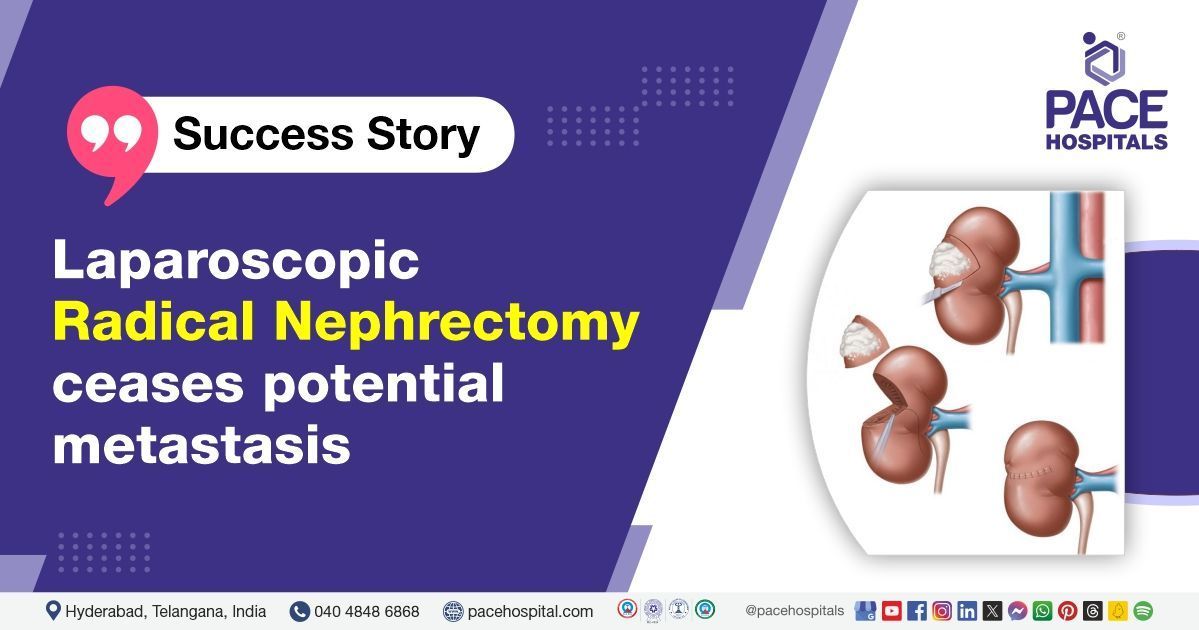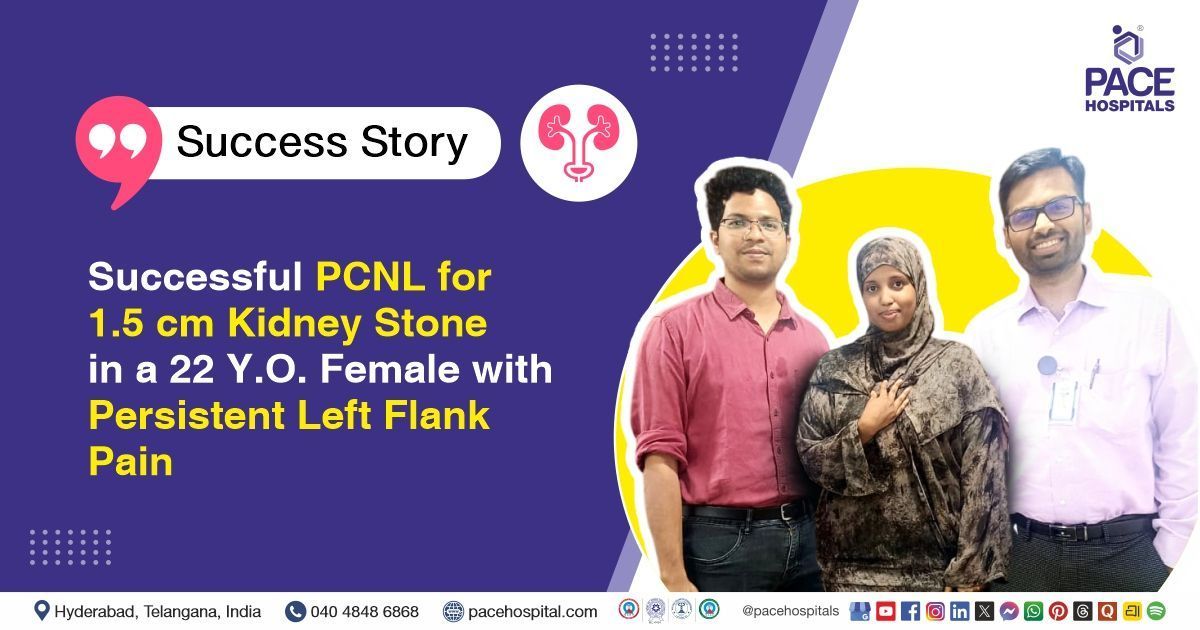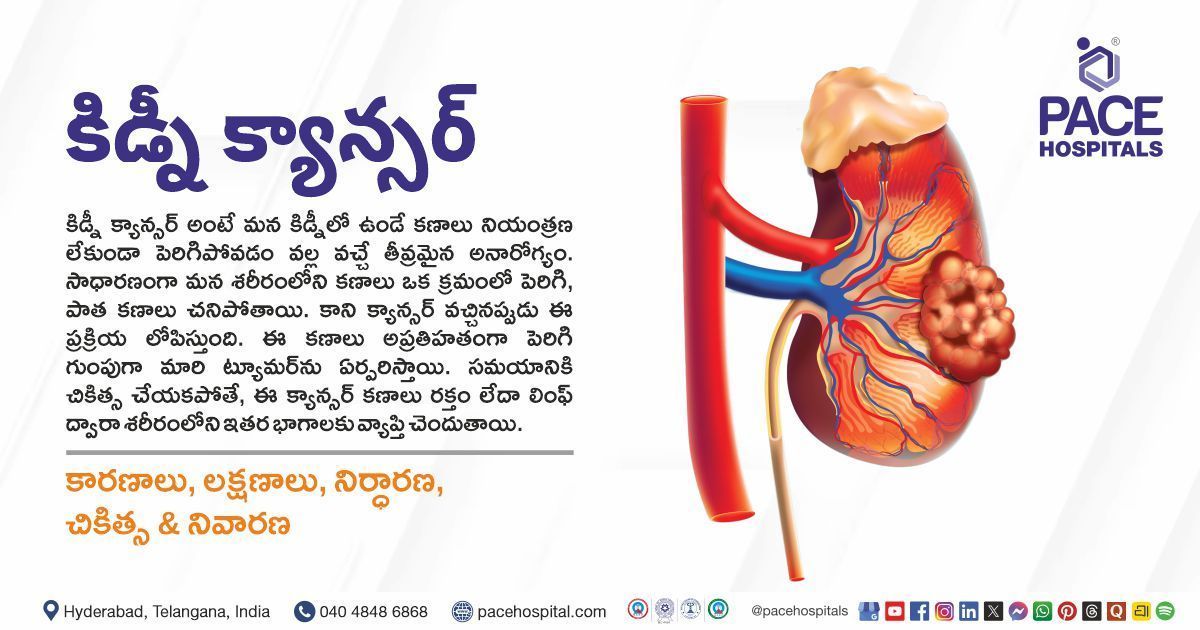Laparoscopic Radical Nephrectomy Ceases Potential Metastasis
PACE Hospitals
PACE Hospitals' Urology team successfully performed a right laparoscopic radical nephrectomy for a 69-year-old female with right renal mass (c T3), anaemia, and diabetes mellitus.
A 69-year-old female patient (Saadiya) with complaints of vague right flank pain and weakness was presented to the consultant laparoscopic urologist, Dr Abhik Debnath, at PACE Hospitals, Hitech City, Hyderabad.
Medical history
Delving deeper, it was understood that the patient was suffering from vague right flank pain (on one side of the body between the lower ribs and the pelvis) and weakness which led to her admission to the PACE hospital for additional care and management. The patient had no history of hematuria (blood in the urine).
Diagnosis
Upon being admitted to PACE Hospitals and understanding the history and physical examination, the patient was subjected to computed tomography urography, complete blood picture (CBP), urine culture, sensitivity, and liver function test (LFT). Evaluating the diagnostic investigations, the patient was diagnosed with:
- Right renal mass (c T3)- abnormal growth in the kidney.
- Anemia- a common condition that occurs when the blood has a lower-than-normal amount of red blood cells or hemoglobin.
- Diabetic mellitus-a disease of inadequate control of blood levels of glucose
Renal mass is an abnormal growth in the kidney. While most renal masses are benign (noncancerous), many of them need to be treated further as they can be malignant (cancerous). Renal masses cannot be detected by physical examination, signs, symptoms, or the anatomy of the retroperitoneum. To diagnose such masses, imaging techniques like computed tomography, magnetic resonance imaging, or ultrasound are used.
Erythropoietin, a hormone that promotes the formation of red blood cells, is produced by the kidneys. Red blood cell counts fall and anaemia develops when the kidneys are injured because they are unable to produce enough erythropoietin.
Treatment
After consultations with the team of consultant laparoscopic urologists- Dr. Abhik Debnath and Dr. K Ravichandra, it was determined that the right laparoscopic radical nephrectomy surgery was the effective method for treating the patient.
A laparoscopic radical nephrectomy is a minimally invasive procedure that can remove the entire kidney, adjacent lymph nodes, and adrenal glands, as well as other surrounding tissue. It has similar oncological results to open nephrectomy and offers the patient substantial advantages, such as decreased need for analgesics and a shortened recovery period.
One day before the laparoscopic radical nephrectomy, urologists performed diagnostic procedures, including computed tomography urography, complete blood picture (CBP), urine culture, sensitivity, X-ray chest, and liver function test (LFT) to look for abnormalities.
Performing these procedures before laparoscopic radical nephrectomy ensures that the urologists have a comprehensive understanding of the patient's condition and anatomy, which guides them in performing the surgery effectively and helps reduce the risk of complications.
With necessary investigations done & clearances obtained, which included a pre-anesthesia checkup, the patient underwent a right laparoscopic radical nephrectomy under general anesthesia. The procedure was supervised by the consultant laparoscopic urologist - Dr Abhik Debnath, and it was accomplished devoid of any complications.
The aftermath
The post-operative period was uneventful, which can be evidenced by the results of improved serum creatinine. The serum creatinine level is one of the indices of renal function. Its normal level ranges from 0.74-1.35 mg/dl . The post-operative haemoglobin is 9.1 g/dl, the levels of haemoglobin of the patient improved from 7.7 mg/dl to 9.1 g/dl.
On the 3rd day, the patient tested positive for urine culture and sensitivity test. The patient acquired Klebsiella pneumonia - a nosocomial infection and was found sensitive to most of the antibiotics except for colistin. Consecutively, the patient’s therapeutic regimen was updated to counter the infection.
Regular tests were done to understand the overall health of the patient. Foley's catheter (a thin, flexible catheter to drain urine from the bladder) was removed on the same day.
The necessary medicines, immunosuppressives, antibiotics, multivitamins, analgesics, antipyretics & other supportive care were given along with the counselling. The patient was discharged upon achieving hemodynamic stabilization, with the necessary medications and advised to continue routine medications, home ambulation, normal diet, chest physiotherapy, triball spirometry, deep breathing exercises, steam inhalation every 2 hourly and incentive spirometry. The patient was advised to avoid weightlifting, bending forward, and to take 2-3 litres of fluids per day.
The patient was also instructed to contact PACE Hospitals in case of fever, abdominal pain, or vomiting. After 2 weeks, the patient was asked to get a review by Dr. Abhik Debnath for dressing, skin staple removal; and biopsy review.
The efficiency of the CT Urography
An abdominal multiphase CT scan that is optimized for kidney, ureter, and bladder imaging, including post-contrast excretory phase imaging, is referred to as computed tomography urography, or CTU.
In the last ten years, CTU has emerged as the principal imaging technique for assessing the urinary tract and is now commonly used in the standard assessment of hematuria patients.
In patients with microhematuria and risk factors for urologic malignancy, computed tomography urography (CTU) is advised as the initial imaging method, according to the 2019 American College of Radiology Appropriateness Criteria. Because the unenhanced phase makes it easy to distinguish between non-enhanced and enhanced lesions, it helps in the characterization of renal masses and the detection of stones.
Share on
Request an appointment
Fill in the appointment form or call us instantly to book a confirmed appointment with our super specialist at 04048486868











